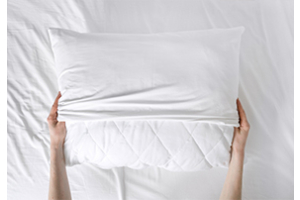It Takes Two To Sleep In A Bed Explained

It Takes Two To Sleep. Romance And Rest.
Ah, the exhilaration of a budding new relationship. Seventh heaven appears on cloud nine. The intimate embrace and expression of newfound love finds its way to the bedroom. There’s the headiness of falling asleep in one another’s arms. Two hearts beat as one.
Fast forward by a month. (Actually, give it a few days.)
Soon enough, “sleeping together” begins to have practicalities. Romance comes with two body temperatures, two sleep routines, two circadian rhythms and two mattress preferences. The right type and amount of “sleeping” that keeps you “together” may need some attention. Unless you and your partner have some kind of cosmically choreographed sleeping technique, you will need to accommodate, or more likely address, one another’s bedtime quirks and habits.
Let’s get to it.
The battle of the bed.
Clearly, this needs to be a win-win. Both partners need to find a sleeping arrangement that benefits their relationship. If you sleep with a partner, you will already be familiar with some of the adjustments or compromises that are needed to ensure you both get a proper night’s rest, together. As much of a comfort and support you may be to one another, you will also have your own comfort and support preference in a mattress.
If one of you prefers a plush mattress, while the other definitively enjoys a firm support, the solution may be in testing a range of medium comfort and support. Ever heard of Dial•a•Bed? Check it out. Preferably, together. Couples are often surprised to discover a vast range of brands and designs, with the latest mattress materials and technology, that can suit both their needs.
The best of both.
It is not unusual for partners to have specific sleep needs that would seem incompatible. One of the most common issues is interrupted sleep when one partner rolls over or comes to bed later. Before casting aspersions about one another’s relationship commitment, consider how vital the quality of your sleep is to a meaningful, rewarding and continued bond. If you simply cannot agree on one mattress, or a mutually beneficial sleeping arrangement, be practical and investigate your options.
1. Motion isolation
The technological advances in restricting motion transfer between partners are quite impressive. You might not be able to see the inner workings of individual pocket spring actions or the new composites in memory foam, polyfoams and latex, but you will certainly feel the difference when you test a superbly constructed double-, queen- or king-sized mattress together. It’s like you both have the same bed all to yourselves.
2. Side by side
Sometimes it’s just the way it is. One of you is plush. The other is firm. There’s just no in-between mattress solution. Except there is. Put two single mattresses together. Or go large and join two double mattresses. You can still enjoy a close intimacy, yet you both get a sound night’s sleep on the comfort and support you really need.
3. Twin beds
There can sometimes be a stigma about couples who choose to sleep apart. There obviously has to be something wrong. Yet some relationships can be all the better and stronger for it. If either partner has a disordered sleep pattern, like routinely having to get up during the night, uncontrollable jerking during the onset of sleep, or really just any involuntary behaviour or excessive snoring that is understandably bothersome to their better half, then sleeping in separate beds is a real and practical consideration. There’s no love lost. Especially when it means getting a proper, restorative night’s sleep. However, if you or your partner are consistently disturbed or disrupted by one another’s sleeping habits (like uncontrollable jerking during the onset of sleep) it might be worth seeking some professional help to check that all is okay.
On an aside, if you really want to liven up a dinner table discussion, ask your friends about their sleeping arrangements. You might be surprised by the practical approaches and revelations that others share. And how much you might have in common.
Keep the love in the bedroom.
Sleep is key to our well-being, both physically and mentally. Our emotional health and capacity for empathy are also directly affected. When there’s not just your partner to consider, but perhaps kids, a daily commute, and work pressures (not to mention that pesky neighbourhood WhatsApp group), keeping yourself and your relationship on an even keel requires some canny teamwork. Being good in bed begins to imply something entirely pragmatic. And long-term.
Sleep scientist, Dr Dale Rae, is not a relationship counsellor. And yet couples and families would do well to heed some practical, somnological advice.
“It is not uncommon for busy working couples, often in frenetic, mid-family mode, to feel just a little grouchy now and then. Relationship issues aside, we so often underestimate, or even disregard, the importance of proper, regenerative sleep in our daily lives.”
“Every next day depends on the quality of our sleep the night before,” notes Dr Rae. “Minds and bodies are like rechargeable devices. For optimal performance, they need to be systematically re-energised. Sleep is essential to the human operating system.”
Operating systems generally come with a few bugs. Let’s identify and solve some possible bedtime hitches with Dr Rae.
Entirely avoidable “pillow fights”.
1. The duvet hog – It’s one of the most common squabbles. Clutching the warmth of a duvet as you roll over on a chilly evening is hardly intentional. But it does come across as slightly selfish to the partner left in the cold. The solution is simple. Get an oversized duvet that is larger than your bed. Alternatively, have separate duvets.
2. Sleep posture and body language – Sleeping postures can often change as a relationship matures. Both partners begin to find their ‘happy place’ when falling asleep together. Entwined or hugging positions can disturb one partner when the other moves. Sleeping closely back-to-back is a common go-to position.
3. Differing sleep-wake preferences – This can be a bit of a challenge at first. We are all naturally predisposed to sleeping and waking earlier, or sleeping and waking later. If one partner goes to bed earlier, leave a soft light on for the other partner. Likewise, have a soft light for when one partner wakes up earlier. Invest in a well-designed mattress that restricts motion transfer.
4. Snoring and sleep apnoea – For the partner kept wide awake, while the other wheezes and snorts away peacefully, the thought of pillow smothering is probably not the best solution. A gentle, yet emphatic, prod can often prompt the culprit to turn over or change position. If snoring persists and you suspect that you or your partner may have sleep apnea, consult a sleep specialist or medical professional.
5. Sleep hygiene – No, it’s not about having a shower and cleaning your teeth before bedtime. Though that’s probably a good idea, too. Sleep hygiene is about how you manage your day in preparation for a good night’s sleep. This is especially pertinent to diet and exercise. Too much caffeine in the afternoons, exercising too close to bedtime, or sneaking in that last nightcap, can compromise the relaxed state of mind and body that we need to engage before sleep.
6. Bad habits – Cellphones, tablets and TV’s need to be on sleep mode. If one of you is an emergency worker, you can set your phone to receive critical messages or calls. If possible, it is better not to have any devices in the bedroom at all. Leave them to charge in the hallway or kitchen. If you have kids, get them into the healthy habit of doing the same.
7. Preferred side of the bed – This can be a tricky negotiation. Or not. Couples often just gravitate to their preferred side. But it’s not a given. All sorts of conscious or subconscious preferences come into play. Proximity to the door, the window, the bathroom, perhaps being left-handed or right-handed. Once you’ve agreed on your side of the bed though, keep to it.
8. Kids and pets – Having a child snuggle into bed after a bad dream is understandable. Once they’ve fallen back to sleep, gently return them to their own bed. It’s generally advisable not to have dogs and cats sleep on your bed. If they do creep up in the night, be sure to remind them whose bed it is. Be sure that you are the ones that are comfortably positioned in your bed.
5 benefits of a great sleeping relationship.
Again, as Dr Rae reminds us, getting regular, quality sleep is critical to both partners' well-being.
1. Sleep is when physical and mental – not to mention emotional – processing takes place. With the right type and amount of sleep every night, you’re more likely to wake up with a clear head and re-energised for the day.
2. Apart from being a shared, intimate space, the bedroom should be a quiet, retiring sanctuary. If it’s been a tough day, try to leave anxieties or aggravations outside of the bedroom. A good night’s rest invariably helps to put things into better perspective the next day.
3. You will likely be more focused and engaged during the day. Sleep is good for teamwork, especially when you’re juggling careers and kids. You’ll be more likely to manage whatever the day throws at you.
4. Healthy, rewarding relationships take some work. Communication, understanding and empathy can be a lot easier and clearer when you’re not overtired or distracted.
5. “Our bodies love rhythm and routine,” notes Dr Rae. “Think of a regular sleep cycle as the anchor or mainstay of your quality of life.”
Blissful sleep with Dial•a•Bed.
Whether you're just embarking on a new relationship, or have been around long enough to finish one another’s sentences, the comfort and support of your mattress is one of the most important decisions you’ll make together. Your vital relationship with sleep starts at www.dialabed.co.za. Pop into a store and test out as many mattresses as you need to.
If you suspect either you or your partner may have sleep-related problems, contact the Sleep Science team at www.sleepscience.co.za. Have an experienced sleep researcher help you to sleep your way to a thriving, rewarding relationship. #SleepForLife.
TAKE CARE: Lifestyle recommendation is not medical advice. Always consult your healthcare professional should you be experiencing prolonged sleep difficulties or related health issues.





